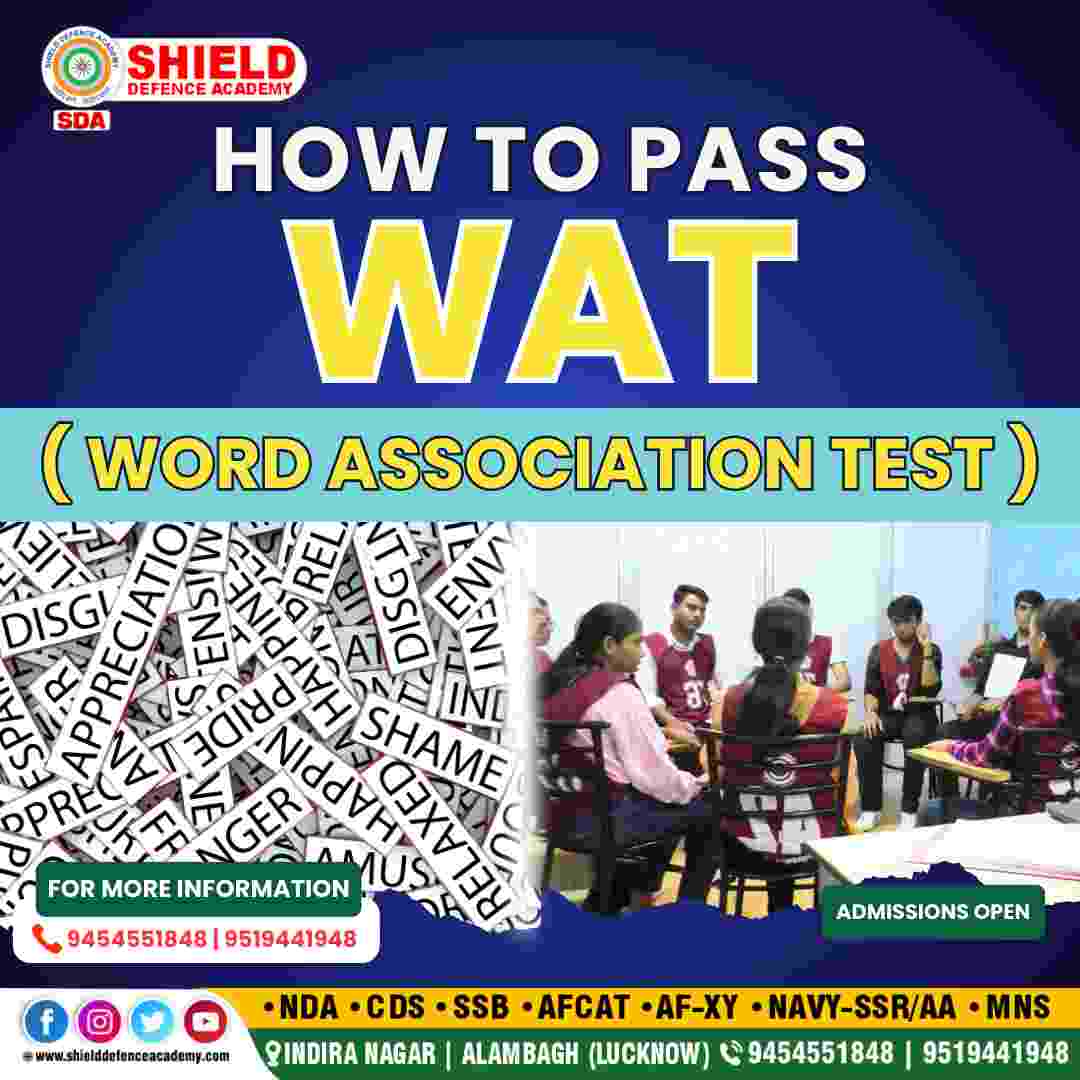How to pass WAT under SSB ?
Here we will discuss about How to pass WAT under SSB ?

WAT is a type of Psychology test in which candidates are provided with a series of words and with that word they have to respond quickly. This is a type of Psychology test in which officers notice the personality, decision making ability,
How To pass the WAT at the SSB (Services Selection Board) interview, keep these ideas in mind:
1.Be Spontaneous: Respond immediately and spontaneously to the provided word without overthinking. Your instant reaction represents your normal thinking process.
2.Stay Positive: Concentrate on positive interpretations of the words presented during the test. Avoid negative connotations and instead express positivity in your comments.
3. Be Relevant: Make sure your answers are relevant to the supplied word. Try to make a logical relationship between the word and your response.
4. Show Confidence: Be confident in your comments. Even if you are unsure, react confidently and clearly.
5. Practice: Do word association activities to boost your response time and originality. This can help you grow more comfortable with the test’s format.
6. Avoid Repetition: Try to provide diverse reactions to different words. Avoid repeating comments, as this may imply a lack of inventiveness.
7. Remain Calm: Maintain your calm during the test. To respond effectively, you must maintain your composure. Following these techniques and practicing on a daily basis will help you enhance your performance in the Word Association Test during the SSB.
How can you practice word association exercises effectively?
To do word association activities efficiently, use these tips for the query How to pass WAT under SSB:
1. Online Resources: Find online platforms or websites that provide word association activities. These tools frequently have a selection of words to practice with.
2. Make Flashcards: Write different words on flashcards and practice linking each word with other words or ideas fast.
3. Group Practice: Play word association games with friends and family members. This collaborative practice can make the exercise both entertaining and challenging.
4.Challenge Yourself: Set a timer for each word. To boost your spontaneity and rapid thinking, set a time limit for yourself to answer.
5. Journaling: Begin a word association diary in which you record words and their corresponding thoughts or concepts. This might boost your creativity and broaden your word associations.
6. Daily perform: Set aside a few minutes per day to perform word association exercises. Consistent practice can help you develop your talents over time.
7.Reflect on Responses: After practicing, consider your responses. Consider how you could have combined the words differently or more creatively. By implementing these tactics into your practice routine, you can significantly improve your word association skills and perform better on exercises such as the Word Association Test.
How can you make word association exercises more challenging?
To make word association exercises more difficult, try increasing the complexity and intensity of your practice sessions. Here are some ways to increase the difficulty level.
1.Speed Rounds: Reduce the time limit for each word association. This will require you to think and react fast, increasing your spontaneity and inventiveness.
2. Themed Associations: Determine a specific subject or category for word associations. For example, you could concentrate on words linked to emotions, occupations, or nature. This adds another level of intricacy to the task.
3. Multiple Associations: Rather than identifying one word with another, try associating each word with several similar words or concepts. This may test your capacity to think broadly and make varied connections.
4.Opposite Associations: Practice linking terms with their inverses. This might be a difficult task that demands you to think in reverse or examine opposing ideas.
5.Random Word Generation: Use a random word generator or ask a buddy to come up with surprising terms for association. This might push you out of your comfort zone and promote new thinking.
6.Group Challenge: Play word association games with a group of friends or peers. Competing against others can make the workout more tough and enjoyable. By combining these tactics into your practice routine, you can increase the complexity of word association exercises and improve your overall skills.
Some examples of positive interpretation under query how to pass WAT
Positive interpretation entails viewing situations, events, or information in a favourable or hopeful viewpoint. Below are some examples of positive interpretation:
1. Challenge as Opportunity: Rather than viewing a difficult work as a burden, consider it an opportunity for growth and learning. Accept obstacles as opportunities to enhance your skills and abilities.
2. Constructive Feedback: When receiving feedback, view it as a chance to improve your performance rather than a critique. View feedback as an opportunity to grow and progress.
3. Setbacks as Learning Experiences: Rather than concentrating on failures or setbacks, view them as learning opportunities. Reflect on what went wrong, take away lessons from the circumstance, and apply that information to improve in the future.
4. Unexpected Change as a New: When confronted with unexpected changes, consider them a fresh start or a new chapter in your life. Accept change as a chance for development and discovery.
5. Different Perspectives: When you encounter opposing thoughts or viewpoints, take them as an opportunity to broaden your understanding and investigate alternate perspectives. Accept diversity of thought as a method to learn and grow. By practicing positive interpretation, you can establish a mindset that sees the bright side of situations, encourages resilience, and supports personal development.
Conclusion about how to pass WAT under SSB
To summarize, taking a positive interpretation approach can have a huge impact on how we see and respond to many events in life. By viewing obstacles as opportunities, failures as learning experiences, and differences as potential for progress, we can establish a mindset that promotes resilience, optimism, and personal development. Embracing positivity in our interpretations not only improves our mental health, but it also enables us to negotiate life’s ups and downs with poise and optimism. Remember that the way we interpret events might influence our experiences and perspectives on life.










